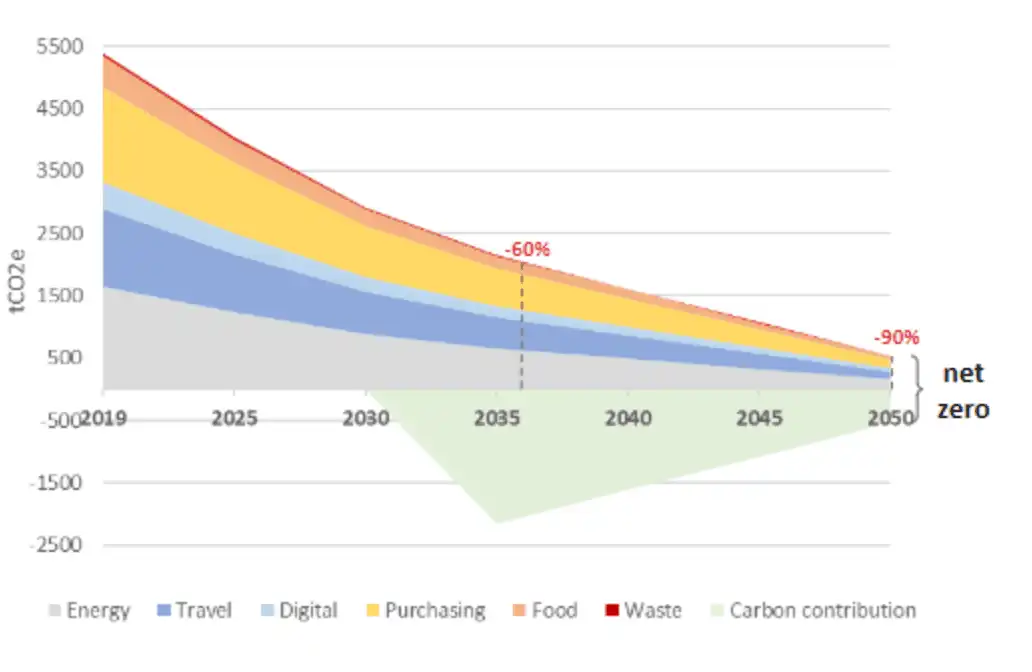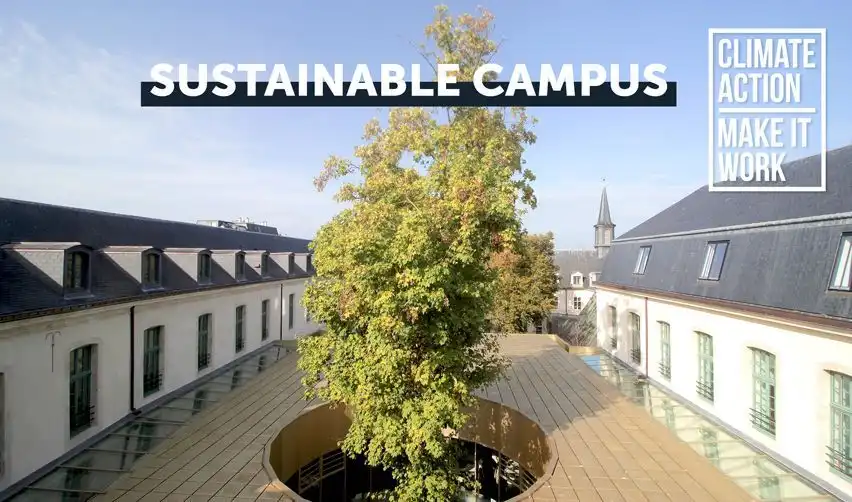
Home>About>Our action for the environement
Our action for the environement
On the strength of 15 years of research and teaching on environmental issues, and with a view to providing concrete responses to climate and ecological challenges, Sciences Po has chosen to place environmental transformations at the heart of its strategic plan.
The institute for environmental change
In 2023, Sciences Po gave new impetus to its commitment by launching the Institute for Environmental Change. It will promote Sciences Po's unique positioning by giving visibility and coherence - in France and internationally - to existing initiatives and programmes. It will also support the expansion of academic and research offerings in the humanities and social sciences, while building bridges with other sciences.
To become the leading research university in the humanities and social sciences
Sciences Po is at the heart of environmental research in the humanities and social sciences. Around a hundred researchers, doctoral students, and post-doctoral fellows work on a wide range of issues. They are spread across 11 research centres, cover a variety of disciplines, and come together in an interdisciplinary dialogue within AIRE (the interdisciplinary environmental research workshop).
The aim of the Institute for Environmental Transformations is to strengthen the coherence and visibility of the many environmental research activities at Sciences Po, and to support interdisciplinary outreach to other key players in the scientific field. For an overview of these initiatives, visit the Institute's website: Bruno Latour Fund, European Chair in Sustainable Development, etc.
Bringing social science analysis and solutions to society
The aim of the Institute for Environmental Transformations is producing knowledge to guide action (political, public, social, and corporate) and magnifying the impact of the fruit of the work of our different entities. Find out more on the Institute for Environmental Transformations website.
Our history: the make it work initiative
Sciences Po has been involved in environmental issues for over 15 years, thanks in particular to Bruno Latour and Laurence Tubiana.
In 2015, we launched Make It Work, a series of initiatives in the run-up to COP21, which ended in success: six months before COP21, students showed that it was possible to 'make the climate negotiations work'.
In 2019, the initiative has been strengthened with a real action plan to adapt teaching and research, make the university more eco-responsible and raise awareness among the public.
The creation of the Institute for Environmental Transformations is a decisive step in amplifying our collective effort towards this strategic priority.
The Institute for Environmental Transformations, created as part of the TIERED project, oversees all of Sciences Po's activities in this area. Its main goals are to
- expand the existing range of courses to train all students, whatever their specialisation, in these issues and in decision-making, and to become Europe's benchmark university for research in the humanities and social sciences.
- Contribute to a new policy of disseminating and promoting knowledge.
- Speed up the process of building bridges with other sciences.
- Promote Sciences Po's unique positioning by giving visibility and coherence to existing initiatives and programmes, both in France and internationally.
- Create an effect of scale to multiply and perpetuate these actions and their impact.
The Institute for Environmental Transformations is developing the following activities through its partnerships in France and abroad:
- structuring research actions with partners ;
- teaching, double degrees ;
- recruitment of research professors and post-doctoral students, hosting visiting professors;
- disseminating and promoting knowledge in the community;
- inclusion in major networks (Alliance U7+, GAUC) to give visibility to the actions set in motion by research and teaching institutions to support the objectives of the Paris Agreement.
Find out more about the Institute for Environmental Transformations.
NET-ZERO TRAJECTORY
Sciences Po is committed to an ambitious net-zero trajectory involving the following direct and indirect greenhouse gas emission reduction targets:
- -90% by 2050 compared to 2019, to reach net zero
- -60% by 2035 compared to 2019, to achieve carbon neutrality
Our interim reduction targets are -30% in 2027 and -46% in 2030 compared to 2019, for scopes 1, 2 and 3.
In addition to these reduction targets, Sciences Po will finance carbon contribution projects aimed at sequestering residual greenhouse gas emissions from scopes 1, 2 and 3 by 2035 at the latest. Emissions linked to the travel of executive committee members will be offset from 2024, via a contribution to the reforestation of the Bois du Boscq in the Landes region, a project with the 'Low Carbon Label' and driven by the operator Stock CO2.
Sciences Po's net-zero trajectory is illustrated by the graph below:

2024-2027 ACTION PLAN
In 2024, Sciences Po adopts a 2024-2027 ecological transition action plan structured around ten strategic areas:
- Energy
- Travel
- Digital
- Purchases
- Catering
- Waste
- Biodiversity and water resources
- Awareness-raising and training
- Exemplarity
- Governance
The first 5 areas of this action plan will contribute directly to our net-zero trajectory. The next 5, while not having a significant carbon impact, are nonetheless major areas of work in the context of an ambitious ecological transition.
Given their carbon impact, the "energy" and "travel" areas are priorities. With regard to energy, the main challenges will be to sustain the good practices introduced by the energy saving plan launched in 2022 and to initiate renovation work based on the monitoring of energy consumptions and the recommendations of the energy audits.
To measure and gradually reduce the carbon impact of business travel, Sciences Po is launching a test phase of the carbon quota mechanism in January 2024.
Download the full action plan.
Methodology
Our climate strategy is based on the net-zero standard method of the Science Based Targets Initiative (SBTi), which defines emission reduction targets that are consistent with scientific recommendations (in line with the Paris agreements).
All Sciences Po communities have been involved in building our net-zero trajectory and the associated action plan, in particular students through the Ecological Transition Student Advisory Committee, research centres involved in the test phase of the carbon quota mechanism, and employees through the Ecological Transition Correspondents network. Numerous working sessions have been organised with the departments particularly concerned by the challenges of the action plan (Real Estate Department, General Services and Resources Department, Legal Affairs Purchasing and Procurement Department, etc.). Members of the permanent faculty were also consulted.
The actions proposed in the 2024-2027 action plan are also based on the results of Sciences Po's first 2020-2023 ecological transition action plan. Out of 45 commitments, 30 have been achieved, 12 partially achieved and 4 have not been achieved. The detailed report can be found at this link. It should be noted that as the action plan was drawn up before the Carbon Footprint, the objectives were prioritised at a later date. Overall, the targets for the areas with the highest emissions were achieved (energy, travel, digital and purchases).
Our collaborative climate platform

Our interactive platform dedicated to Climate Action: Make It Work was launched in April 2019. Users participated in a first online consultation organised in anticipation of the European elections last spring. A second consultation took place in November 2019, so as to gather proposals for our sustainable campus from students, teachers and university staff.
Make It Work: a 2015 triumph

Make It Work was inaugurated with the first of two 2015 success stories: six months before the COP 21, 200 students proved that climate negotiations could "work". An international agreement was reached after four days of intense simulated discussion, paving the way for the success of the “real” COP 21.